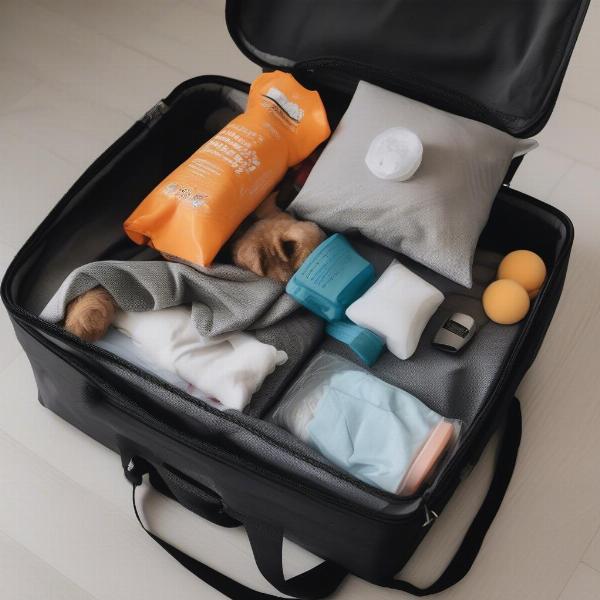Understanding dog boarding requirements is crucial for a smooth and stress-free experience for both you and your furry friend. Whether it’s a short weekend trip or an extended vacation, knowing what to expect and how to prepare will ensure your dog’s safety and well-being while you’re away. This guide covers essential boarding requirements, from vaccinations and paperwork to behavioral assessments and what to pack.
Essential Vaccinations and Health Records
Most boarding facilities require proof of up-to-date vaccinations to protect all dogs in their care. Core vaccines typically include rabies, distemper, parvovirus, and adenovirus. Some kennels may also require bordetella (kennel cough) and canine influenza. Ensure your dog’s vaccinations are administered at least two weeks before their stay to allow for full immunity.
Beyond vaccinations, many boarding facilities will request a recent health certificate from your veterinarian. This certificate confirms your dog’s overall health and absence of contagious diseases. It also provides important information about your dog’s medical history, allergies, and any ongoing medications.
Behavioral Assessments and Temperament Checks
Many reputable boarding facilities conduct temperament evaluations to ensure the safety and compatibility of all dogs in their care. These assessments help determine your dog’s social skills, comfort level with other dogs and people, and overall demeanor. Some facilities may require a separate temperament test appointment before your dog’s boarding stay. Be honest about your dog’s behavior to ensure they are placed in an appropriate environment. If your dog has any known aggression or anxiety issues, discuss these with the boarding facility staff to determine if they can accommodate your dog’s specific needs.
What to Pack for Your Dog’s Boarding Stay
Packing the right items can make your dog’s boarding experience more comfortable and familiar. Bring your dog’s regular food to avoid digestive upset, along with familiar bedding, toys, and treats. Label all items clearly with your dog’s name and your contact information. While some facilities provide bowls and bedding, bringing your dog’s own items can help them feel more secure in a new environment. Avoid packing excessive items, as space may be limited.
 Essential items packed for a dog's boarding stay
Essential items packed for a dog's boarding stay
Preparing Your Dog for Boarding
Introducing your dog to the boarding facility before their stay can help ease anxiety and familiarize them with the new environment. Many facilities offer short “daycare” visits to allow your dog to explore the space and meet the staff. This can be particularly helpful for anxious or first-time boarders. Ensure your dog is well-exercised before drop-off to help reduce stress and promote relaxation during their stay. Inform the staff about your dog’s routines, preferences, and any special needs.
Choosing the Right Boarding Facility
Selecting the right boarding facility is paramount to your dog’s well-being. Research different facilities in your area, read reviews, and visit potential locations in person. Look for clean, well-maintained facilities with attentive and caring staff. Inquire about their safety protocols, emergency procedures, and staff-to-dog ratios. Observe how the staff interacts with the dogs and assess the overall atmosphere of the facility. Choosing a facility that aligns with your dog’s needs and your peace of mind is essential for a successful boarding experience.
Conclusion
Preparing your dog for boarding involves understanding and meeting specific requirements to ensure a safe, healthy, and happy stay. From vaccinations and health checks to behavioral assessments and packing essentials, taking the necessary steps will contribute to a positive experience for both you and your furry companion. Remember to research and choose a reputable boarding facility that prioritizes your dog’s well-being and provides a comfortable and stimulating environment.
FAQ
- What vaccinations are typically required for dog boarding? Most facilities require rabies, distemper, parvovirus, adenovirus, and often bordetella (kennel cough).
- What should I pack for my dog’s boarding stay? Pack food, familiar bedding, toys, treats, leash, collar, and any medications.
- How can I help my anxious dog adjust to boarding? Introduce them to the facility beforehand with a short visit, exercise them before drop-off, and bring familiar items.
- How do I choose the right boarding facility? Research, read reviews, visit potential locations, and inquire about safety protocols and staff-to-dog ratios.
- Why are temperament assessments important? They ensure the safety and compatibility of all dogs at the facility and help staff place your dog in an appropriate environment.
- What is a health certificate and why is it needed? It confirms your dog’s overall health and provides important medical history information.
- How far in advance should I book my dog’s boarding stay? Booking in advance, especially during peak seasons, is recommended to secure a spot.
ILM Dog is your trusted global resource for expert dog care and breeding advice. We provide comprehensive guidance on various aspects of dog ownership, from breed selection and health care to training and nutrition. Whether you are a seasoned dog owner or just starting your journey, ILM Dog offers practical and reliable information to help you provide the best possible care for your canine companion. Contact us today for personalized advice! Email: [email protected], Phone: +44 20-3965-8624. For more valuable information, visit ILM Dog.